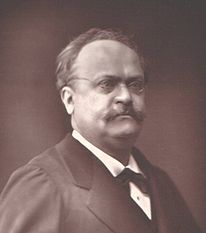
Alexandre Charles Lecocq
Encyclopedia

Paris
Paris is the capital and largest city in France, situated on the river Seine, in northern France, at the heart of the Île-de-France region...
– October 24, 1918, Paris) was a French
France
The French Republic , The French Republic , The French Republic , (commonly known as France , is a unitary semi-presidential republic in Western Europe with several overseas territories and islands located on other continents and in the Indian, Pacific, and Atlantic oceans. Metropolitan France...
musical composer. He was admitted into the Conservatoire
Conservatoire de Paris
The Conservatoire de Paris is a college of music and dance founded in 1795, now situated in the avenue Jean Jaurès in the 19th arrondissement of Paris, France...
in 1849, being already an accomplished pianist. He studied under François Bazin
François Bazin
François Emmanuel Joseph Bazin was a well-known French opera composer during the nineteenth century. His works are not widely performed today.-Biography:...
, François Benoist
François Benoist
François Benoist was a French organist, composer, and pedagogue.Benoist was born in Nantes. He studied music at the Conservatoire de Paris and won the Prix de Rome in 1815 for his cantata Œnone. In 1819, he became organist and professor of organ at the Conservatoire; he held the latter post for...
, and Fromental Halévy
Fromental Halévy
Jacques-François-Fromental-Élie Halévy, usually known as Fromental Halévy , was a French composer. He is known today largely for his opera La Juive.-Early career:...
, winning the first prize for harmony in 1850, and the second prize for fugue
Fugue
In music, a fugue is a compositional technique in two or more voices, built on a subject that is introduced at the beginning in imitation and recurs frequently in the course of the composition....
in 1852. He first gained notice by sharing with Bizet the first prize for an operetta in a competition instituted by Offenbach
Jacques Offenbach
Jacques Offenbach was a Prussian-born French composer, cellist and impresario. He is remembered for his nearly 100 operettas of the 1850s–1870s and his uncompleted opera The Tales of Hoffmann. He was a powerful influence on later composers of the operetta genre, particularly Johann Strauss, Jr....
.
His opéra comique
Opéra comique
Opéra comique is a genre of French opera that contains spoken dialogue and arias. It emerged out of the popular opéra comiques en vaudevilles of the Fair Theatres of St Germain and St Laurent , which combined existing popular tunes with spoken sections...
, Le Docteur Miracle, was performed at the Théâtre des Bouffes Parisiens
Théâtre des Bouffes Parisiens
The Théâtre des Bouffes-Parisiens is a Parisian theatre which was founded in 1855 by the composer Jacques Offenbach for the performance of opéra bouffe and operetta. The current theatre is located in the 2nd arrondissement at 4 rue Monsigny with an entrance at the back at 65 Passage Choiseul. In...
in 1857. After that he wrote constantly for theatres, but produced nothing especially successful until Fleur-de-thé (1868), which ran for more than a hundred nights. Les cent vierges (1872) was also favorably received. Yet all his previous successes were cast into the shade by La fille de Madame Angot
La fille de Madame Angot
La fille de Madame Angot is an opéra comique in three acts by Charles Lecocq. The French text was by Clairville, Paul Siraudin and Victor Koning.-Performance history:...
(Brussels
Brussels
Brussels , officially the Brussels Region or Brussels-Capital Region , is the capital of Belgium and the de facto capital of the European Union...
, 1872), which in Paris in 1873 was performed for more than 400 nights consecutively, and which has since gained and retained enormous popularity. After 1873 Lecocq produced a large number of operettas, though he never equalled his early triumph in La fille de Madame Angot. Saint-Saëns
Camille Saint-Saëns
Charles-Camille Saint-Saëns was a French Late-Romantic composer, organist, conductor, and pianist. He is known especially for The Carnival of the Animals, Danse macabre, Samson and Delilah, Piano Concerto No. 2, Cello Concerto No. 1, Havanaise, Introduction and Rondo Capriccioso, and his Symphony...
was a friend of Lecocq's, and never ceased to admire the latter's music.

